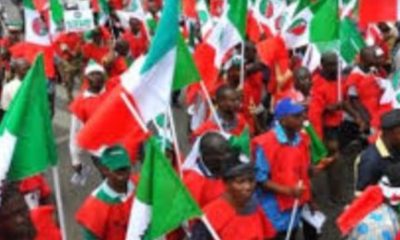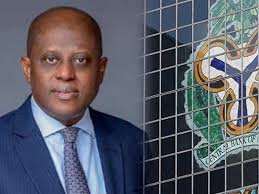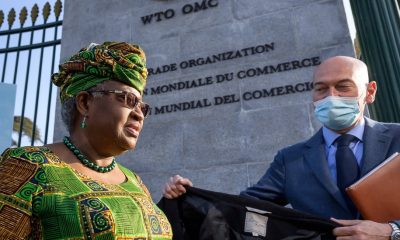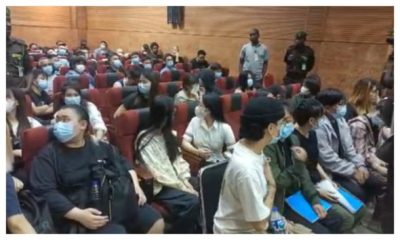News
We’re yet to receive FG’s rice, Citizens in Kaduna, Kano, Katsina lament

Some residents of Kaduna, Kano and Katsina States say they have yet to receive the rice recently donated to the states by the Federal Government to them.
The News Agency of Nigeria (NAN) recalls that the Federal Government had doled out 20 trucks of rice to the 36 states and the FCT.
NAN also reports that this was part of its sustained efforts to ramp up food supplies in the country with a view to further bolstering food security.
It was also part of the Federal Government’s synergy with the sub-nationals to lessen the current hardship being faced by Nigerians.
This hardship was aggravated by the persistent food insecurity and ever -surging food prices.
However, with the recent bumper harvests in parts of Nigeria, Nigerians are heaving a sigh of relief, although there are palpable fears that the happy development may be temporary.
Some residents of Kaduna metropolis have lamented not receiving the Federal Government’s rice allocated to the state governments to cushion the hunger currently faced in the country.
Some of the residents, who spoke to the News Agency of Nigeria (NAN) said that they only heard about the rice on the news.
Salisu Musa, a resident of the Rigasa area, said he and his family did not benefit from the rice, adding that he had not heard of anyone close to him who got the rice.
He said, “As a traditional title holder in the Rigasa community, we have not seen any rice from the Federal Government.
“However, we have received fertilizer and we appreciate it.”
Similarly, Ibrahim Yusuf, a resident of the Doka area, said he has not received the rice but has heard that a few bags were taken to a Mosque in the area.
He also acknowledged that fertilizers were shared in his area and numerous people had benefitted.
Meanwhile, the Nigerian Union of Journalists (NUJ) Kaduna State Council, had on August 15 received some bags of rice from the Arewa Youth Assembly (AYA).
The group had announced that it had received 2,400 bags provided by the President Bola Tinubu-led Federal Government.
Mr Muhammad Ibrahim, one of the journalists who benefitted said the rice was shared to faith-based organisations and journalists, among others, adding he got a 25kg bag of rice
Also, in Kaduna state, some residents in parts of the Chikun Local Government Area have
complain of not getting the relief items to cushion the effects of the food crisis from the state government.
The few persons, who confirmed that they received some food items from the state officials said the quantity of such was too insignificant.
They also blamed some of the community leaders in charge of the distribution of the palliatives of being biased and not transparent.
However, a cross section of the residents in the city said they were yet to receive any item from the state officials in that regard.
One of the residents, Mrs Asabe Markus, claimed she had not received any palliative so far.
She, however,opined the items were only distributed to residents with political affiliation to the All Progressives Congress (APC).
She said, “Since the food crisis began, I have been struggling to survive by relying on the support of friends and loved ones, who have food items and cash in abundance.”
Also, Mrs Rakiya Hadi, a resident, said she was only privileged to receive two measures of rice, which were distributed by a community leader
” My friend who is a community leader gave me two measures of rice, how can that feed a family for just a week?”she retorted
Hadi said the leader had to distribute the food item secretly to avoid commotion by the residents as the grain was not enough for all the people.
Another resident, Mr Audu Mallam, said nobody on his street around KASUPDA road In Sabon Tasha, has benefited from the government’s palliatives.
He recalled, “During the COVID-19 period, information was passed for the people to collect palliatives at the government schools, but as of now, no one is saying anything.”
Mrs Grace Waziri, another resident of the state, described the exercise as a ‘charade’, adding that the government was not being sincere with the people with the palliatives.
She disclosed that she has not received any relief item from the government, noting that few of her friends, who are civil servants, had collected such items from the office.
Waziri said, “Two of my friends who are civil servants showed me what the state government distributed as palliatives. It was very ridiculous and insulting.
“So, it’s clear that they are only sharing the palliatives to people who do not really need it and keep on lying that they have distributed food to vulnerable residents.”
In Kafanchan, some of the said residents also said they were yet to receive any rice palliatives from the Federal Government.
The residents made this known in separate interviews with the News Agency of Nigeria in Kafanchan, headquarters of Jema’a Local Government Area.
Marta Maigari, a retired civil servant, said though she read in the media about the Federal Government’s donation of 20 truck of rice to each state, nothing of such had reached the people of Kafanchan.
“We have not seen any rice from the Federal Government here in Kafanchan.
“I say so because I always keep myself abreast of happenings, so I would have known if the government had gotten here,” she stated.
Maigari stated that the hardship faced by families and individuals at this time calls for decisive and compassionate action.
On his part, Godwin Kumai, the Coordinator of Jema’a Community Development Charter, a civil society organisation, said no rice palliatives from the Federal Government have been received and shared at the local government level.
Kumai explained that only bags of fertiliser from the state government were currently shared to some vulnerable people in the area.
A top official of the local government, who spoke on condition of anonymity concurred with Kumai.
He staed that the local government was yet to receive any rice allocation from the Federal Government.
“I don’t know if the state government has taken delivery of the items donated by the Federal Government.
“But as for use here in Jema’a Local Government Area, we are yet to receive anything from the centre through the state,” he added.
In Zaria, there were mixed reactions by different sources in the council over the distribution of the palliatives.
The Technical Assistant to the Council Chairman on Strategic Communications, Alhaji Bello Habib, said the council received 600 bags of maize and millet as intervention from the state government.
He explained that the 600 bags had been distributed to the 547 polling units across the 13 wards of the council.
“Each polling unit got one bag and the remaining bags were shared to the boarding secondary schools in Zaria.
“The beneficiary schools were Kufena College, Al Huda-Huda College, Barewa College and Government Girls’ Secondary School Zaria,” Habib said.
However, Habib declined to speak on the rice palliative to the council from the federal government.
Mohammed Abdullahi, a resident of Unguwar Fatika Area, Zaria told NAN that he was not aware of the distribution of any rice from the government.
Similarly, Haruna-Rasheed Musa of Kakaki Area, Zaria said he did not receive any intervention from either the state or local government.
Aliyu Idris-Ibrahim, Chairman, Zaria Local Government Council did not respond to calls and messages put on his cellphone on how the council distributed the Federal Government’s rice palliative.
Malam Aminu Bello, a resident of Layin Zomo Area,Basawa Ward, Sabon Gari Local Government Area, said he did not receive any support be it rice, maize or fertilizer from the government.
A source at the Sabon Gari Local Government which craved anonymity told NAN that a trailer load of rice was only seen at the Secretariat.
“The trailer went out of the council Secretariat to an unknown destination with the rice,”he said.
Alhaji Mohammed Usman, Chairman, Sabon Gari Local Government Council did not respond to calls and messages sent to his cellphone..
Sources at Giwa and Makarfi LGAs said the councils did not receive the rice from the government as at the time of filing this report.
However, all efforts to get the comments of Hajiya Rabi Salisu, Kaduna State Commissioner for Human Services and social Development proved abortive as she was said to have travelled out of Nigeria.
In Katsina State, a Coalition of Civil Society Organisations (CSOs) in Katsina State pledged to ensure that the rice distributed to the state by the Federal Government is shared to the targeted beneficiaries.
The Chairman of the coalition, Alhaji Abdulrahman Abdullahi, disclosed this in an interview with the News Agency of Nigeria (NAN), in Katsina.
NAN recalls that the state government had constituted a committee to oversee the distribution of the rice on July 29, and gave it a three-week deadline to submit its report.
The committee’s terms of reference were to ascertain and confirm the number of bags received, and develop a procedure for sharing the rice across the 34 local government areas.
The committee would also ensure that the distribution of the palliatives is done in a fair and transparent manner, targeting vulnerable individuals such as widows, divorcees, aged men and women, among others.
Abdullahi, who is also the Chairman, Katsina Social Protection (SP) Network, revealed to NAN that they are keenly monitoring the committee, as it was presently compiling the names of the beneficiaries.
He stated that the state and LGA levels committees were already formed and the CSOs have representation in all the committees across the 34 local governments.
“The SP network will leverage on the LGAs structures of the coalition of the CSOs in the state and monitor the implementation of the distribution and report their findings.
“The findings will be worked on and we will come up with our position at the end of the exercise,” according to Abdullahi.
NAN reports that the main committee at the state level was headed by the Secretary to the Government of the State, Alhaji Abdullahi Garba-Faskari.
Members of the committee included the Special Adviser on Public Service Administration Reform, Commissioners for Special Duties and Information.
Others were the representative of the State House of Assembly, Managing Director, of the state Irrigation Authority, Executive Chairman, Zakat and Waqf Board, Commander, Hisbah Board and the ALGON Chairman.
The remaining were representative of the Police, DSS, Katsina and Daura Emirate Councils, as well as that of the JIBWIS and Darika Islamic sects, the Youth Council of Nigeria, Nigeria Youths Congress
and Civil Society Organisations (CSOs).
Meanwhile, in Kano, the state government said it has distributed 130 trucks of foodstuffs it received as donation from the Federal Government to the beneficiaries across the 44 local government areas.
The state Commissioner for Agriculture and Natural Resources,
Dr Danjuma Mahmud, Commissioner for Agriculture and Natural Resources, disclosed this to the News Agency of Nigeria(NAN) in Kano on Wednesday.
Mahmud said the donation consisted of 40 trucks of 25kg rice,70 trucks of maize, millet and sulphur.
According to him, the food items were delivered at the headquarters of the 44 local governments for onward transportation to wards, villages and districts.
He said the beneficiaries of the gesture included: Civil Society Organizations(CSOs)and traditional rulers,religious leaders.
Others were the officials of the 44 local governments,the state Hisbah Commission, the Police and the Nigeria Security and Civil Defence Corps(NSCDC).
The commissioner also disclosed that the state government had received 70 trucks of fertilizer from the warehouse of the Central Bank of Nigeria(CBN) located in Minna, Niger.
Also collected from the warehouse,he said, were 30 trucks of urea.
He said the state government was now awaiting directives from the Federal Ministry of Agriculture and Natural Resources on how to distribute the fertilizers to the farmers
You may like
-
2025: How To Plan A Budget For The Upcoming Year
-
Ruud van Nistelrooy Opens Up on Hurtful Manchester United Exit Before Taking Leicester City Job
-
Obasanjo would have died under Abacha if not for me -Gowon
-
Why I don’t trust any public institution in Nigeria – Fisayo Soyombo
-
Minimum Wage: Cross Rivers Workers to embark on indefinite strike
-
Bayer Leverkusen Forward Victor Boniface Faces Possible Sanction for Reckless Driving Incident
-
Radda approves N70,000 minimum wage for Katsina workers
-
PH refinery has not commenced bulk sales – NNPC
-
CBN issues Dec. 1, ultimatum against banks, ATM delays
-
WTO chief Ngozi Okonjo-Iweala reappointed to second term
-
Tinubu hails Okonjo-Iweala’s WTO reappointment
-
Alleged hacking: Arraigned foreigners, Nigerian collaborators plead not guilty
News
Ruud van Nistelrooy Opens Up on Hurtful Manchester United Exit Before Taking Leicester City Job

New Leicester City manager, Ruud van Nistelrooy, has shed light on his departure from Manchester United, expressing feelings of disappointment and hurt over how his exit unfolded.
The Dutchman, who stepped in as United’s interim manager after Erik ten Hag was sacked, has revealed he held an open and candid discussion with United’s new boss, Ruben Amorim, before his departure last month.
Van Nistelrooy explained that taking on the interim role was motivated by his deep connection with the club, its people, and its fans.
However, once Amorim arrived, the Portuguese manager opted not to include Van Nistelrooy in his coaching setup, a decision that left the former United striker disheartened.
“I stepped in as interim manager because I wanted to help the club during a difficult period,” Van Nistelrooy said.
“My intention was clear—I was there to assist United, and I was open to staying on in any capacity to continue that support.
So, when I was informed that I wouldn’t be part of the new coaching team, it was a tough pill to swallow.
I was disappointed, very much so, and it hurts.
”He added, “United is a club that means so much to me, and the bond I share with the fans and the people there is something I hold dear.
The only assistant managerial role I would have considered at this stage in my career was at United.
That’s why it stung even more to be shown the door.
”Despite his disappointment, Van Nistelrooy acknowledged the complexities of the situation, admitting that as a manager himself, he could understand Amorim’s perspective. “When I reflected on it, I got my head around the decision.
I understand that a new manager would want his own setup and might see my presence as a potential complication. It’s part of the job, and I respect that.
”Van Nistelrooy credited his conversation with Amorim for helping him move on. “I spoke to Ruben about it, man to man, manager to manager.
He was honest and respectful, and I’m grateful for that. It really helped me process everything and turn my focus to new opportunities.
”Shortly after his departure, Van Nistelrooy began discussions with Leicester City and was eventually appointed as their new manager.
The move, he said, has rejuvenated his spirits. “While leaving United hurt, the chance to take charge at Leicester City is an exciting new chapter for me, and I’m fully committed to making the most of it.
”As Van Nistelrooy transitions into his role at Leicester, his departure from United underscores the challenges even the most beloved figures face in football’s ever-evolving landscape.
News
Obasanjo would have died under Abacha if not for me -Gowon

Former Head of State, General Yakubu Gowon has narrated how former President Olusegun Obasanjo could have been killed for an alleged coup plot in 1995 under Gen. Sani Abacha if not for him.
Gowon said this at the maiden edition of the Interdenominational Unity Christmas Carol and Praise Festival organised by the Plateau Government.
The News Agency of Nigeria reports that Obasanjo was arrested in 1995 by General Sani Abacha and convicted of being part of a planned coup to overthrow his government.
Obasanjo, despite pleading innocent to the coup, was sentenced to death.
He spent three years in prison before he was released in 1998 following the death of Gen. Abacha on June 8 of that year.
While Gowon was the Special Guest of Honour at the event, Obasanjo was the Guest of Honour, respectively.
“I wrote a letter to Abacha, I pleaded with him that God made him a leader to do good and not evil.
“I sent my wife with the letter in the middle of the night to Abacha in Abuja; I pleaded with him that such a thing should not happen.
“I’m glad that soon after that, things changed, and not only that Obasanjo left prison, he became our president in 1999.
“This is something that only prayers and sincerity can do; I’m happy that today myself and Obasanjo are here to celebrate the unity of Plateau,” he said.
Gowon also thanked the state government for organising the carol, adding that it would further unite the citizens of the state.
The former head of state said that the state had gone through a myriad of security challenges. Hence, the carol provided a suitable avenue for the people to commune.
News
Why I don’t trust any public institution in Nigeria – Fisayo Soyombo
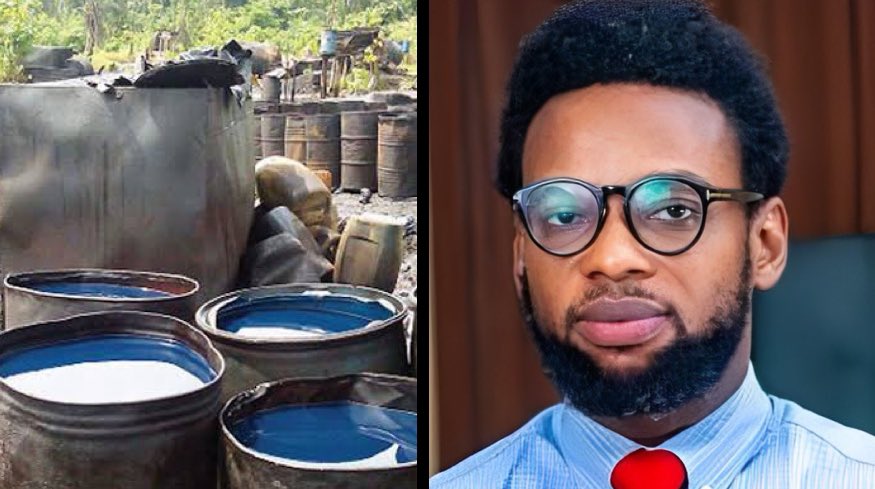
The founder of the Foundation for Investigative Journalism (FIJ), Fisayo Soyombo has revealed why he doesn’t trust any public institution in Nigeria.
Soyombo revealed this on Saturday during an interview on Arise Television, following his arrest and detention by the Nigerian Army for three days in Port Harcourt, Rivers State before he was released on Friday.
The investigative journalist explained that everything he told the army during interrogation was leaked to suspected oil thieves who also told him the exact things he said.
“How can you grill me at the 6 division and everything I told you, the illegal bunkerers were telling me. Every single thing,” he said.
“The real grouse of the army is that one, I did not carry them along. I would not deny that I have low trust for Nigerian public institutions.”
The FIJ founder added he does not trust any public institution in Nigeria dur to his ordeal investigating stories as an undercover journalist.
“A small two-minute diversion. Last year, I did an undercover investigation on an orphanage selling babies. I bought a new born baby for N2 million. I took the baby to NAPTIP, I looked after that baby,” he said.
“After I handed over the baby to NAPTIP, I sent a representative to go there every month. Her birthday, we bought a gift, Christmas same. We woke up one day and NAPTIP shut the door on us.”
The Nigerian Army had confirmed the arrest of the investigative journalist at an illegal oil bunkering site in the Niger Delta region.
The arrest, which sparked widespread concern and condemnation, occurred during an operation against oil theft and pipeline vandalism.
The confirmation followed public outcry over Soyombo’s detention, with the FIJ reporting on X (formerly Twitter) that Soyombo had been in Army custody for three days.
News
Minimum Wage: Cross Rivers Workers to embark on indefinite strike
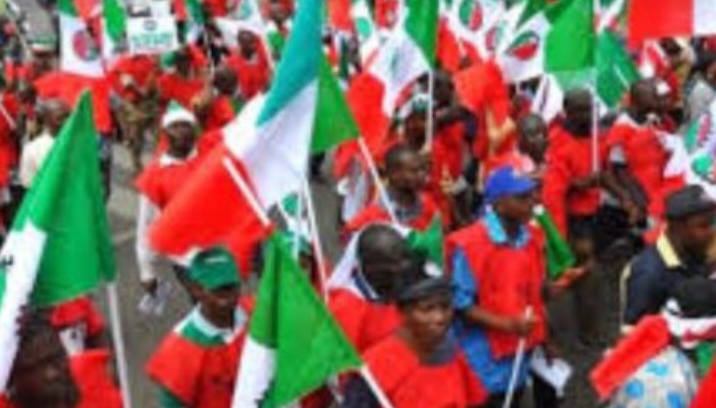
The organized labor unions in Cross River State have announced plans to embark on an industrial action due to the state government’s failure to implement the newly approved minimum wage of ₦70,000.
This decision was confirmed by the Chairman of the Trade Union Congress (TUC) in the state, Mr. Monday Ogbodum, on Saturday in Calabar.
According to Ogbodum, the Nigeria Labour Congress (NLC) has set a deadline for the strike to commence at midnight on Sunday if the state government fails to meet their demands.
Speaking on behalf of the labor unions, he emphasized that there would be no backing down on the industrial action unless the government promptly implements the new wage structure.
“Yes, we are still in talks with the government,” Ogbodum said. “We had a meeting on Thursday, followed by another on Friday that stretched into the late evening. Another meeting is scheduled for today (Saturday).
However, this does not mean that all is well. While the government has shown some seriousness in addressing our concerns, our position remains clear: even if we sign any document or agreement today, it does not equate to actual implementation.
“The TUC chairman further explained that negotiations are ongoing, but the unions are prepared to join the strike should the need arise.
He stressed that labor unions are seeking tangible actions and not just verbal commitments.
Labor unions in Cross River State, including the NLC and the TUC, have expressed their dissatisfaction over the prolonged delay in adopting the new minimum wage policy.
The ₦70,000 wage adjustment was introduced to provide relief for workers amidst rising inflation and economic challenges.
Despite the federal government’s endorsement of the policy, some states, including Cross River, have been slow to implement it, citing financial constraints.
Union leaders argue that the state government has had ample time to prepare for the policy’s implementation and should prioritize the welfare of its workers.
They have warned that any further delay will be met with decisive action, as workers are no longer willing to endure the economic hardships caused by inadequate wages.
The situation remains tense, with stakeholders closely monitoring the outcome of the ongoing discussions between labor representatives and the state government.
The unions have called on the government to act swiftly to prevent the strike, which could disrupt essential services across the state.
News
Bayer Leverkusen Forward Victor Boniface Faces Possible Sanction for Reckless Driving Incident

Bayer Leverkusen forward, Victor Boniface, has landed himself in hot water following allegations of reckless driving and mobile phone usage on a highway in Germany.
The Nigeria international reportedly posted a photo on social media that showed him scrolling through his phone while driving his Mercedes-Benz.
The 23-year-old’s actions have sparked widespread criticism, with fans and commentators expressing disappointment at what they described as irresponsible behavior.
The incident has not only drawn public backlash but has also caught the attention of his club, Bayer Leverkusen.
Manager Xabi Alonso has expressed his disapproval of the forward’s conduct, hinting at potential disciplinary action. Speaking to BeIN Sports, the former Real Madrid and Liverpool star did not mince words regarding Boniface’s behavior.
“I don’t like it; it’s obviously not good, and of course, it’s not allowed to happen,” Alonso stated firmly.
“I haven’t seen Boni [Boniface] yet, but he knows it’s not allowed. We have to tell him he’s not allowed to do something like this.
”The coach’s remarks reflect the club’s commitment to maintaining high standards of discipline and professionalism among its players.
Such actions, particularly those involving risky driving behavior, not only tarnish the image of the player but could also bring unwanted negative attention to the club.Boniface’s alleged use of his mobile phone while driving breaches both German traffic laws and the moral expectations placed on public figures like professional footballers.
In Germany, it is illegal to use a handheld device while driving, with violators facing fines and potential driving bans.
Additionally, as a role model to young fans worldwide, Boniface’s actions could set a harmful precedent if not addressed appropriately.Since joining Bayer Leverkusen, Boniface has been a key figure for the club, earning plaudits for his performances on the pitch.
However, this off-the-field controversy threatens to overshadow his accomplishments. Fans have taken to social media to express their concerns, with many urging the young striker to prioritize safety and uphold the values expected of a professional athlete.As the club investigates the incident, it remains to be seen what disciplinary measures will be taken.
For now, the focus is on ensuring that the message is clear: such behavior is unacceptable. The situation serves as a stark reminder of the responsibilities that come with fame and the importance of setting a positive example, both on and off the field.
News
PH refinery has not commenced bulk sales – NNPC

The Port Harcourt Refining Company (PHRC) has not yet commenced bulk sales or opened its purchase portal, as essential processes are still being finalised.
The Nigerian National Petroleum Company Limited (NNPC Ltd.) says an official announcements will be made if and when price reviews on the products occur.
Mr Olufemi Soneye, Chief Corporate Communications Officer, NNPC Ltd. in a statement on Friday, said currently its products being sold were originated from the Dangote Refinery.
The 60,000 barrels per day (bpd) capacity refinery began truck-out of petroleum products on Tuesday in Port Harcourt following its rehabilitation.
Some petroleum marketers and Nigerians have raised operational concern about the refinery as regards to pricing.
The Petroleum Products Retail Outlet Owners Association of Nigeria (PETROAN) also confirmed that the Refinery had not released any new price for products purchase.
The association said that it bought PMS with the old pricing template while awaiting the new prices.
“Currently, the products we are selling originate from the Dangote Refinery and include applicable Nigerian Midstream and Downstream Petroleum Regulatory Authority (NMDPRA) fees,” he said.
“Products from PHRC are exclusively for our retail stores at this stage. Our pricing is reviewed and adjusted periodically as necessary to reflect operational realities.
“We advise the public to disregard any misleading information regarding pricing. Official announcements will be made if and when price reviews occur,”.

2025: How To Plan A Budget For The Upcoming Year

Ruud van Nistelrooy Opens Up on Hurtful Manchester United Exit Before Taking Leicester City Job

Obasanjo would have died under Abacha if not for me -Gowon

Why I don’t trust any public institution in Nigeria – Fisayo Soyombo

Minimum Wage: Cross Rivers Workers to embark on indefinite strike

Bayer Leverkusen Forward Victor Boniface Faces Possible Sanction for Reckless Driving Incident

Radda approves N70,000 minimum wage for Katsina workers

PH refinery has not commenced bulk sales – NNPC

CBN issues Dec. 1, ultimatum against banks, ATM delays




